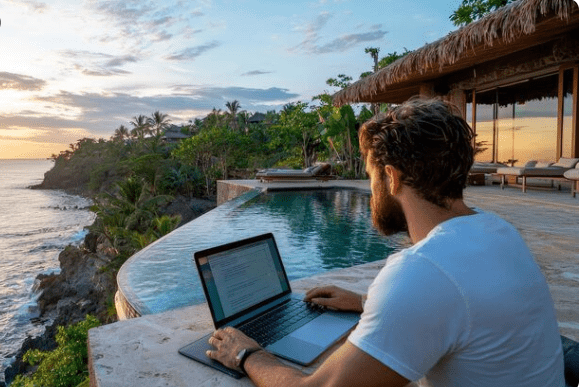The ultra-wealthy now view ownership as more than just material belongings; it is about building their own universes. The appeal of isolated island getaways has drawn millionaires looking for seclusion, stability, and meaning in recent years. These sanctuaries are living representations of identity, independence, and foresight rather than merely being emblems of wealth.

The new language of luxury is private islands. They symbolize something remarkably akin to contemporary kingdoms: independent, tranquil, and fully governed. Owning a private island feels like an extremely uncommon kind of freedom for billionaires who are constantly scrutinized. These days, it’s about sovereignty, space, and stillness more than luxury.
Why Billionaires Are Investing in Remote Island Retreats
| Category | Details |
|---|---|
| Trend Focus | Billionaires purchasing private islands and ocean sanctuaries |
| Key Motivations | Privacy, exclusivity, sustainability, and long-term wealth security |
| Popular Regions | French Polynesia, the Maldives, Seychelles, Fiji, the Bahamas, and the Caribbean |
| Typical Investment Range | Between $50 million and $500 million per private island estate |
| Architectural Characteristics | Solar-powered villas, coral restoration programs, water purification systems, floating residences |
| Notable Owners | Richard Branson (Necker Island), Larry Ellison (Lanai), Elon Musk (Pacific property), Jeff Bezos (Caribbean estate) |
| Reference |
It is especially reasonable to want to be alone in the linked world of today. Privacy is now the most sought-after privilege that money can purchase due to constant visibility. Retreating to private shores affords a sense of security that no city penthouse could ever offer to someone like Richard Branson, whose Necker Island has become a model of eco-luxury, or Jeff Bezos, who supposedly owns an island in the Caribbean. In an era of constant exposure, the need for isolation is not only physical but also emotional.
These getaways are especially creative since they combine luxury with awareness of the environment. The days of unrestrained consumerism as a result of riches are long gone. Status is now defined by sustainability. With the use of solar energy, desalination systems, and coral restoration projects, several of these estates run completely off the grid. One of the best examples is Larry Ellison’s island of Lanai in Hawaii, a creative experiment where luxury and green technology coexist. He has turned it into a working ecosystem that includes organic farming, renewable energy, and cultural restoration.
These retreats are the result of great architectural inventiveness. Every element is specially designed to reflect the owner’s values. Some islands have glass-bottomed spas hovering over coral gardens, infinity pools carved into cliffs, and underwater wine cellars. Other features include art galleries that blend in with the surroundings or meditation decks that open straight to the sea. These estates are more than simply residences; they are individual manifestos made of stone, wood, and salt air.
Private islands have a greater sense of security than only their aesthetic appeal. They provide safety during emergencies, such as pandemics, market turmoil, or political upheaval. These sanctuaries frequently have hydroponic farms, rainwater collection systems, and even their own electricity grids in order to be completely self-sufficient. Billionaires can live peacefully off the grid for months in these incredibly efficient ecosystems. For many, this security is practicality rather than paranoia.
Despite their remoteness, these islands serve as hubs for communication. Only dependable friends, family, and partners are invited to these getaways, which are extremely uncommon. Powerful discussions take place at these secret retreats, where agreements are made, innovative endeavors are initiated, and cultural concepts are subtly shared. These locations serve as private salons where influence develops through closeness rather than visibility.
Remote islands have shown remarkable success in protecting wealth when it comes to investments. Prices have increased due to exclusivity, climate attractiveness, and land scarcity. Over the past ten years, premium real estate markets around the world have underperformed compared to top coastal estates, according to analysts. A private island serves as a tangible asset that is impervious to many of the instabilities that beset conventional investments, as well as a statement of lifestyle.
In terms of culture, billionaires’ increasing island ownership represents a move away from public excess and toward individual preservation. The goal of the new luxury is to fully own something, not to acquire more. It illustrates a shift in society from rivalry to reflection. This shift in perspective affects how the wealthy express themselves and ripples through several businesses. The noisy glitter of exposure has given way to the quiet strength of seclusion.
Innovators and celebrities have done the same. According to reports, Elon Musk, who is renowned for his futuristic outlook, made an investment in an unidentified Pacific resort that runs solely on renewable energy. Conservation projects and climate think tanks can be found on Richard Branson’s island. Beyond recreation, these have evolved into test sites for sustainability, a very pragmatic combination of prominence and charity.
This trend also shows how contemporary millionaires see legacy. These islands are heirlooms—heritage projects meant to last for generations—as well as private retreats. Many owners imagine their offspring strolling along the same beaches, inhaling the same sea air, and gaining not only material wealth but also philosophical knowledge. In a time of impermanence, they are creating permanence.
Beneath all this grandeur lies an emotional truth. Despite their wealth and power, billionaires are still people looking for peace. The desire for beauty, control, and belonging is satiated by these sanctuaries. They are manifestations of who you are, not merely places to visit. Every island is, in a way, a geographical diary entry: intimate, poetic, and intensely personal.
The ramifications are not limited to luxury. These properties are raising the bar for innovative design as sustainable architecture develops. Ocean-based conservation approaches, AI-managed island infrastructures, and self-sufficient floating dwellings are already being tested. What started out as a status symbol is now becoming a model for life in the future, one that has the potential to affect entire coastal towns.
This behavior can be sarcastically viewed as an overindulgence in exercise. However, viewed in a different light, it is a type of radical adaptability. Billionaires are redefining responsibility rather than running away from it in these uncertain times. They are subtly helping to create solutions that will outlive their names by supporting environmental research and renewable technology within their getaways. Even if it is motivated by personal ambitions, it is especially advantageous for global sustainability.
These private havens are a symbol of exclusivity and hope. They contend that even among the wealthiest people, there is a rising understanding of the importance of striking a balance between comfort and conscience, as well as between innovation and integrity. The trend’s lyricism and strength come from that dichotomy.
